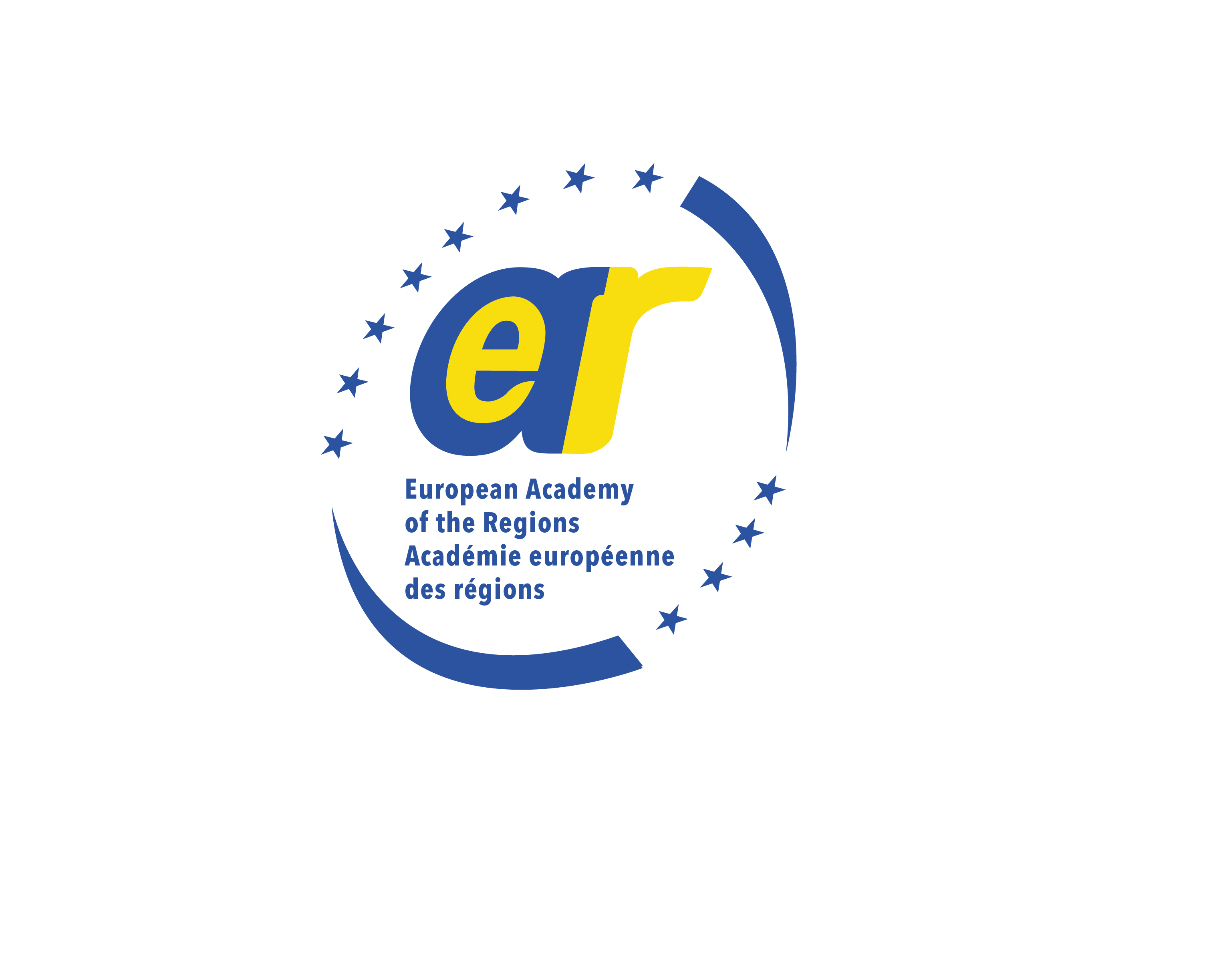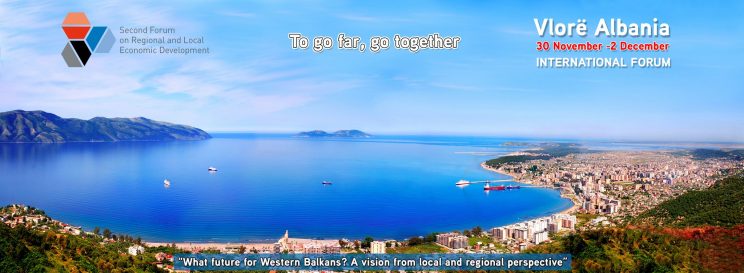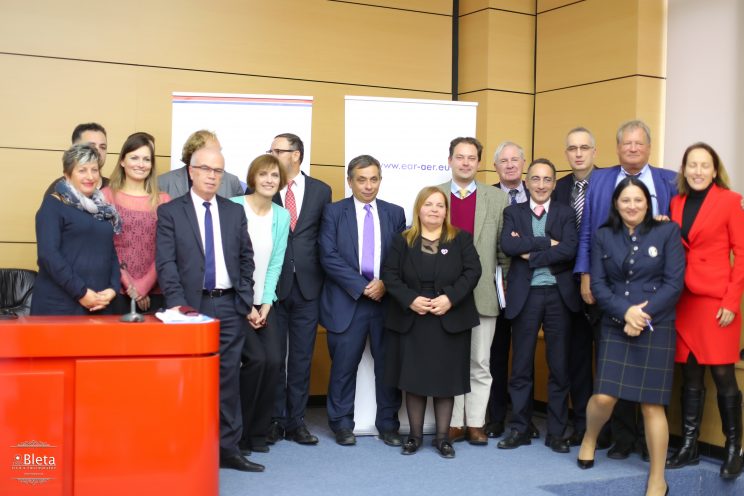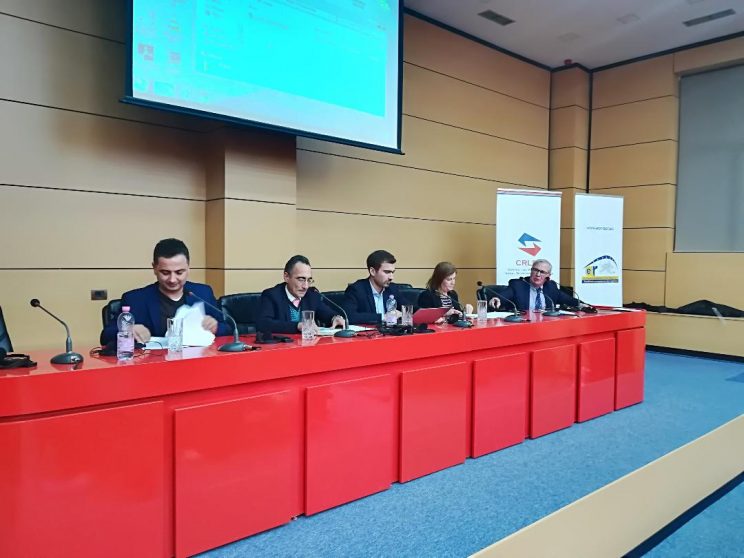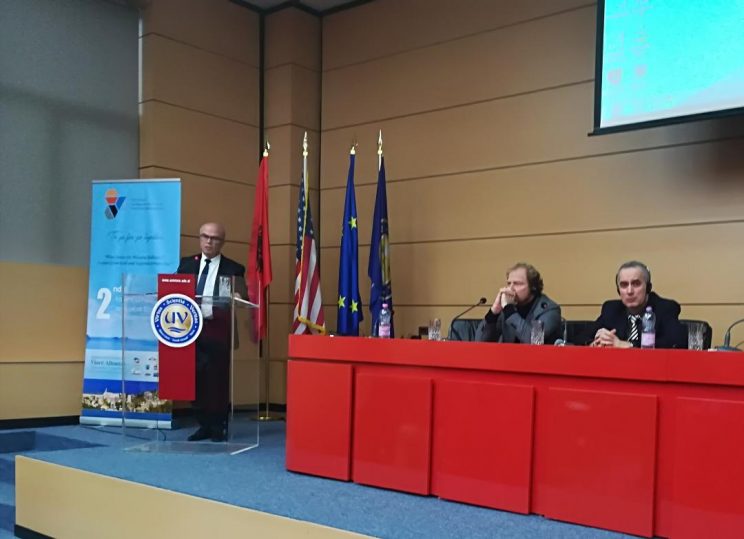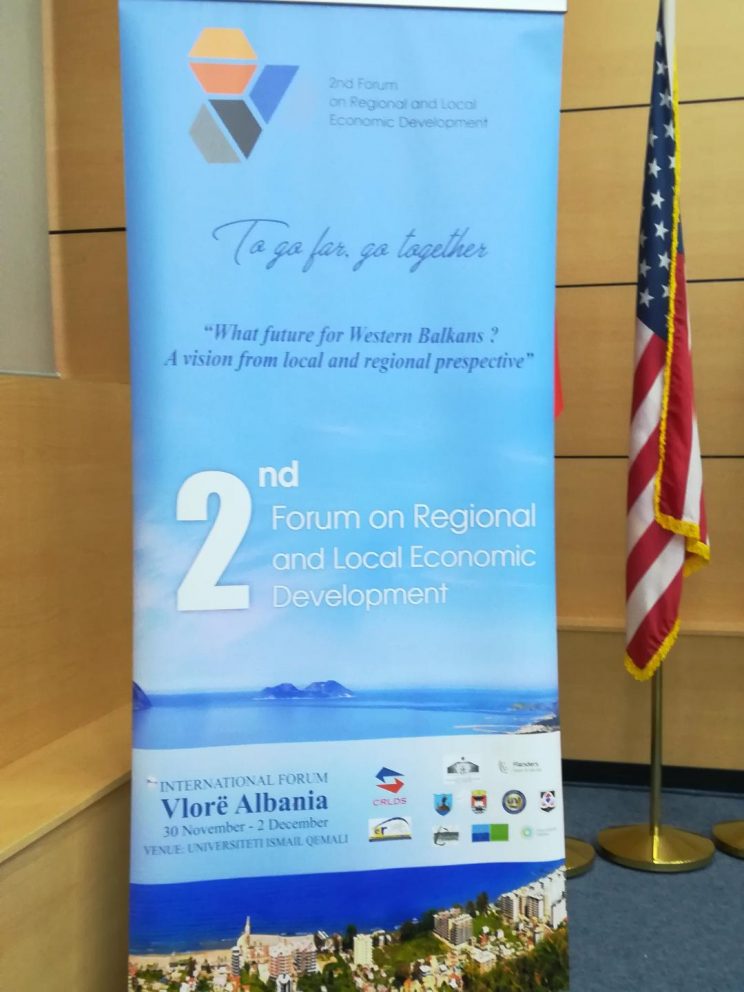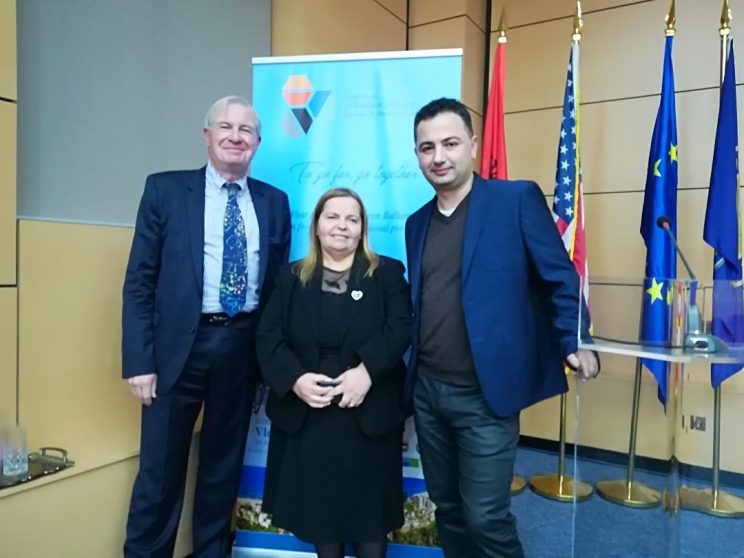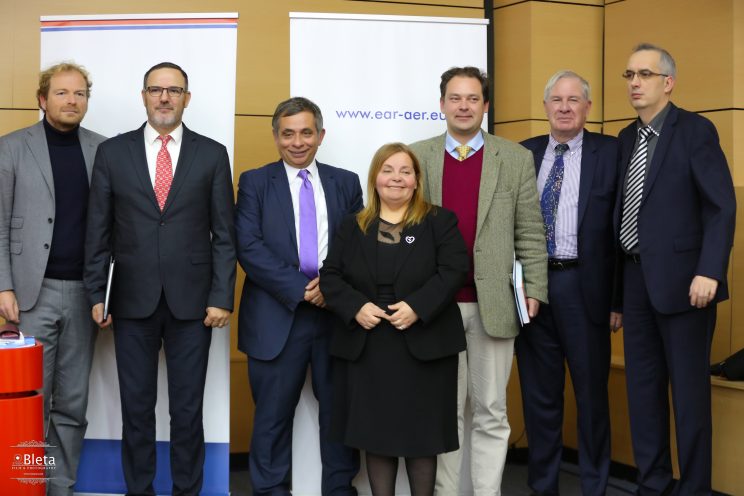On December 1st and 2nd took place the Second Western Balkans Forum on Regional and Local Economic Development in the Albanian city of Vlorë, at the Adriatic coast, unfortunately under torrential floods’ circumstances. The forum gathered more than twenty speakers out of 10 countries, among which academics and practitioners from Albania, the UK, Hungary, Serbia, Bulgaria, Kosovo, Romania, Italy, Belgium, the Netherlands and France in the rectorate’s venue of the Ismail Qemali University of Vlorë. The forum was honoured by the presence of the Albanian vice-minister of Energy and by the former president of the European Economic and Social Committee and honorary member of EAR-AER, Mr. Henri Malosse.
The forum was organized by the Centre for European Policy Studies for Regional and Local Development in cooperation with the European Academy of Regions, the Ismail Qemali University of Vlorë, the Regional Council of Vlorë Region, Vlorë Municipality, Regional Youth Centre of Vlorë and took place under the auspices, support and strategic cooperation of many international, European and Western Balkan Organizations as such as OECD, Ersa, Western Balkans Network etc.
The 2017 edition is supported by the Government of Flanders and the Ministry of Infrastructure and Energy of Albania, under the auspices of the Minister Mr. Damian Gjiknuri. It is the merit of Mrs. Luiza Hoxhaj, Executive Director of the Centre for European Policy Studies for Regional and Local Development to have gathered this strong set of speakers and to have convinced the above mentioned sponsors and academic committee as well as to have developed the content of these fruitful two days.
National preoccupations and goals
Dr. Elena Miteva, Senior Advisor to the OECD South East Europe Division[1] gave an overview of what the OCDE considers as the preoccupations of the governments in all developing economies. The policy areas cover a myriad of subjects such as: economics, advice and global standards, Competition, Technology, agriculture, energy, entrepreneurship, social issues, science, education, financial affairs, taxes, health, environment, work-life balance, development, anti-corruption, trade and Employment. The OCDE as well as the G-20 insist in their advice to combine these preoccupations with their goals for sustainable development which are: inclusive growth, gender, climate & growth, skills, innovation & digital economy, agriculture, development, trade & investment, financing for investment, employment for social policy, framework from strong sustainable and balanced growth, energy, environment and green growth, taxation, financial sector reform, anti-corruption. In this context several speakers such as Henri Malosse pleaded for a collaboration between all the small countries around the Adriatic and Ionian sea. Several initiatives are put on place. The OCDE pointed out at the GREEN Action Programme in Eastern Europe, the Caucasus and Central Asia and the EU has renewed its strategic plan in EUSAIR, the EU Strategy for the Adriatic and Ionian region. This strategy was presented in the European parliament on November 8th . Unfortunately, Kosovo and Macedonia are not included in this new strategic plan. It is sad that nationalistic motives of other countries on the Balkan are able to blackmail even the European Union. On the other hand, this should not prevent regions to collaborate cross-border. We will treat the content of this action plan further on.
http://www.adriatic-ionian.eu/component/edocman/34-action-plan-eusair-pdf
Local and regional involvement
Most speakers pleaded for a national governmental commitment, with financial implications, to provide the necessary manoeuver space to regional and local authorities, not considering them as a threat but as a level of authority with specific goals and tasks. Albania is under the effect of a reorganisation towards less municipalities with more power and into less regions, with less power and more defined tasks. This reorganisation of the country in fewer local authorities and regions is to be applauded, because it tends to a more efficient use of budgets and aspires to a more efficient organisation of the tasks to be executed. But it is important that the responsibilities attributed to the regional and local level are to be taken seriously. The Macedonian examples presented by the Macedonian ambassador in Tirana Dr. Marjan Nikolov, showed clearly that central governments are afraid of delegating responsibilities to a lower level and forget to provide them with the necessary funds foreseen by the law. Moreover, during the transitional period in Albania, things should not stop because of the reorganisation of public administrations. On a regional and local level, the essence lies in the collaboration of the various social and economic actors in the field through a quadruple helix construction.
In her speech, dr. Blerina Brami, of the University of Padua, pleaded very deeply for a dialogue between authorities, universities and business world. But also pointed out that this dialogue in Italy was not easy to establish.[1]
Dr. Luigi A. Dell’Aquila, Scientific Director of the Foundation Calabria Roma Europa, Italy insisted also on the collaboration between the academic and the business world and provided with examples of social development projects from the Calabria region in Italy. The opinion and involvement of local actors are paramount in the development of less advantaged regions.
Dr. Irena Đokić of the Zagreb University presented the Local Action Groups (LAG) for the development of rural areas in Croatia, having as aim an integral implementation of economic and social cohesion.
In his presentation about circular economy, Louis Delcart of the Free University of Brussels and board member of EAR-AER, insisted upon a quicker involvement of the young generation in the Balkan countries, because they think in new terms. They are less interested in the issues of a traditional economy and agriculture but choose resolutely for the digital economy, because they are much more acquainted with it and aware also that they can play in an equal level playing field with the rest of the world. Disciplines like internet of things, 3D-printing, app development, circular economy, local energy development, sharing economy, elderly care at home e.a. are well known domains for them, whereas strategy makers in the political parties are less aware of it. Moreover, many of these disciplines require limited investments and are therefore accessible to new start-ups. Youth has an important role to play because they are less biased by the former communist top-down mentality. Moreover, according to speaker, the enormous youth unemployment rate should be tackled by self-employment and by local development initiatives. The reason why he proposed the subject of circular economy was because of the opportunities the discipline presents for start-ups and the benefit it can give to the entire community.
Regional priorities
In her presentation, Dr. Irena Đokić from the University of Zagreb, insisted upon the role of regional authorities as monitors and promotors of the life preferences of the population. These could be resumed in three categories: residential preferences, mobility and accessibility and public service provision.
This last subject observed an expansion of urban areas into the rural ones, a better transport connectivity with services in the region and a better access to important sources of knowledge, enabling households to satisfy their consumer preferences. She also indicated that in most of the European countries, as well in Western, Central as Eastern Europe there are fundamentally different priorities between cities and rural areas and that ask therefore for different priorities and a different approach. A regional and local approach is therefore paramount when it comes to stimulating liveability in Europe.
Civil society
One of the pillars of a successful development in both developed as developing countries is the presence of a well-functioning civil society. The cause of resilience of regions with less potential, has been the presence in the region of a dynamic civil society. By civil society, we understand in Western Europe in the first place: [1] chambers of commerce, labour organisations, employers organisations, cultural organisations, health care organisations, universities and technical university colleges and the press. Dr. Marjan Nikolov, president of the Centre for economic analyses, thought us that the reality in Eastern Europe is different. Civil society organisations in Eastern Europe are based upon the legal statute of the organisation, which has to be a non-profit organisations.
All above mentioned organisations, who constitute the pillar of Western European “Fourth power”, are public organisations and therefore not included in the list. The American consultants, who set up the system, have been counting heads, not content, when they have determined the power and impact of civil society in post-communist European countries. Which makes that most “not-for-profit” organisations have been set up by political parties in order to influence the public opinion. And are therefore also not intending to collaborate, on the contrary.
This does not mean that no initiatives are taken:
- Mirela Koci, Executive Director at AULEDA in Albania, described small initiatives, enabling start-up companies and organisations to create sustainable employment. The approach was bottom-up, looking for opportunities and for a market. The result was some 100 new employments.
- Vuk Velebit, a Serbian journalist, described the impact of an electronic newspaper “European Western Balkans”[3] treating on European integration and other EU-related topics in the Western Balkans. European Western Balkans is a web portal that focuses on the Western Balkans countries and reports on the development of the EU’s enlargement policy. The portal was launched in 2014 by the Centre for Contemporary Politics. Being independent, the portal was able to tackle subjects without the intervention of nationalist sources and had a real impact on the public opinion.
- dr. Reinhard Eichweber, board member of EAR-AER, with a speciality in psychiatry, and an important experience in Romania, made an intervention on the integration of patients with psychiatric disorder, and the infrastructure that guarantees to handle the guidelines, in emergency problems as myocardial infarct- infarct in brain- in which no time should be lost. He tackled thereby the differences of health service in the towns and countryside and pleaded for a strategic approach without duplication with that regard.
Advocacy for local and regional leadership
The regional approach with its regional and local authorities, creates on the other hand a need for local and regional leadership. Mayors and governors do not have to be ideologists. They have to be practical and hands-on intellectuals. They have to have the ability to co-design and co-ordinate actors and have to know how to mobilize local resources from the bottom. This requires a new professionalism. On the other hand it requires from local institutional actors the ability to cooperate in the initiation and conduct of shared development paths that mobilize local resources and expertise. The European cohesion program insists upon the creation of a basic and an intermediate authorities’ level, considering the benefits of the regional approach. But the reality shows that many mayors and governors stick to simple remedies when it comes to tackling regional and local problems such as unemployment or management of migrants. Innovation and creativity comes often from other sources than politicians, and the latter are not ready to experiment with new methodologies.
Themes requiring a regional involvement
Several topics are in evolution and require more attention from local and regional authorities.
Spatial planning is one. Albania has a strategic plan since one year. It lacks being underpinned with data, is more based upon a SWOT analysis but has the merit to exist. But it needs to be filled in on a regional level and needs to be rebalanced. It is the regional strategy of Vlorë for example to modify the aim of its port from transport of goods to transport of persons. But the national strategic plan wants to make of Albania the logistic hub of the region. The regional plan of the Vlorë region bans large fishing boats from its fishing grounds, but will see many cruise ships in the harbour crossing the fragile fishing grounds due to the option of person transport and the promotion of tourism. In terms of spatial planning, Albania’s previous policy created an inextricable problem: houses everywhere without any building permit, with no sewages and no electricity supply. This situation has an impact on the touristic future of the coast line, but also on the resilience of the country facing the climate change in general. Brussels-based architect Dean Fushekati, invited as speaker by EAR-AER, insisted on the strong urge for spatial planning on macro- and micro-level and on restriction and monitoring of the building permits. Land should be protected, constructions should be densified in specific locations, businesses should be collocated in industrial zones, close to population areas, in order to minimise the impact of car transportation.
Economy in general and green economy in particular is as second topic to promote in a professional way.
The EUSAIR action plan, assembling initiatives in most Western Balkan countries, focuses on Blue growth, Environmental quality, Sustainable tourism and Connecting the Region. Regions and cities are invited to come up with ideas and to participate to this venture to which the EU is contributing financially. The Blue growth focuses on fisheries and aquaculture and on maritime and marine governance and services. Topics that are already present in the Albanian regional scope. The “connecting the region” aspect tackles maritime transport but also intermodal transports to the hinterland. We note already several developments of motorways and motorway connections from sea to hinterland planned by o.a. the Albanian government, waiting for PPP-financing tools. The Energy network TAP is also considered in this framework. We also observe a number of initiatives for sustainable tourism, with a diversified offer and a responsible management.
However, the problem of these initiatives is a scattered series of good intensions if they are not co-ordinated by a regional authority. This leads then to nice restorations of historic buildings and other patrimony without building the infrastructure to reach it, or without signalisation enabling the tourist to find its way. And certainly not, offering him on his smart phone, through an app, the information he needs to enjoy his visit. Regional authorities have definitely a role as co-ordinator to play in this regard. Not only in monitoring the conditions for the attribution of quality awards and stars to hotels on a regular basis, but also in order to maintain the infrastructure towards touristic locations in a decent condition.
Dr. Stanislav Shmelev, director of “Environment Europe“, Oxford, UK and guest lecturer at Edinburgh University made an appreciated presentation on the impact of green economy in all European countries. His point of view was that green economy requires a focus of scientific research so that policy makers can build upon relevant figures. Figures should be multidimensional identifying as well environmental priorities, social priorities, smart economic priorities. Mr. Louis Delcart, board member of EAR-AER, continued with a practical presentation of applications in circular economy and the impact it could have on employment. His feeling is that the implementation of the theory of green economy and circular economy requires a mind-set and that this mind-set is already present among the young generation, but that there is a generation gap. Howeverthe start of the momentum is certainly present. Circular economy is therefore one of the directions that could be taken in order to solve the unemployment problem but asks for the involvement of regional authorities as well as the traditional civil society and the press as steering and encouraging entity promoting the opportunities inside the business world.
In the same economic framework, dipl.ing. Nelu Neacsu, president of EAR-AER gave an overview of the main apps such as Uber, Skype, WhatsApp, AirBNB, Amazon that are used worldwide and insisted upon the increased use of it in Albania. This worldwide development provoked also a creation of apps in Albania, such as Ghirafa.com, 100 oferta, Manoolia or Autobox. He indicated also the key sectors in Albania where apps could be useful, such as government, tax and public services, healthcare, tourism, banking and the sharing economy.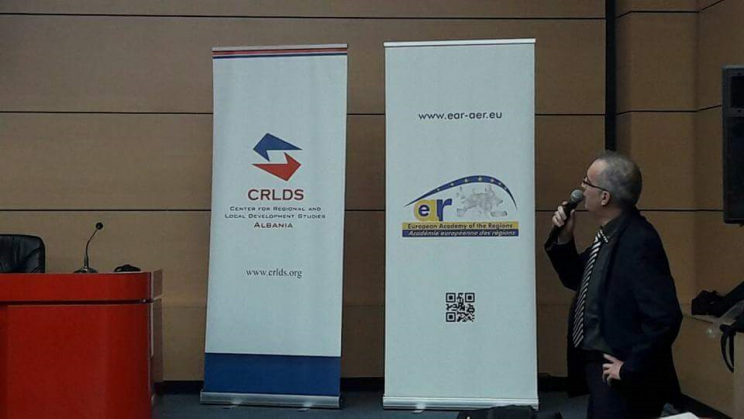
Finally, an important sector that is expected to be subject to an important shift in approach is the energy sector. Although Albania disposes of a lot of possibilities for building hydro-energy power plants and reaching a carbon-neutral status, every politician should be aware of the developments of the other renewable energy circuits, such as wind- and solar energy, that will enable households and small companies to become stand-alone energy consumers, especially when the batteries become powerful enough to stock overproduction for a later period of the day or the week. Dr. Stephan Ressl, member of the EAR-AER board and energy specialist, treated the subject during the conference. It is clear that regional authorities have to be involvement in this new approach of energy distribution, even if national authorities consider it as a threat for tax income sources and are afraid of power interruptions due to unorganized distribution of energy.
Time for discussion
The main objective of the Forum was to promote a European approach on regional and local development by the promotion of an exchange of ideas, of reflections and prospects and by the encouragement of academics to collect more comprehensive information on “real world” issues. It intended in this way to influence policy makers to use what emerges from the academic debate and encourages citizens and civil society to play an active role in social, political, economic and scientific life providing them with tools for a better – shared- future in the Western Balkans countries.
The Forum was expected to contribute to a better understanding of regional and local economic development perspectives in designing, monitoring and implementing related policies and to produce a set of recommendations to improve territorial capacities. In the coming month a publication grouping all speeches and PowerPoint presentations should be published enabling scholars but also policy makers and civil society volunteers to reflect on the data and observations and to draw conclusions for an improved action plan.
The 3rd Forum will be organised in October 24-27, 2018 in Vlore, Albania.
https://lodelcar.tumblr.com/post/167493980995/from-circular-economy-to-internet-of-things-new
